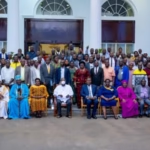A recent land eviction incident in Kiboga District has sparked widespread concern, prompting President Yoweri Museveni to order a thorough investigation. The eviction, which involved a dispute between two parties with competing land titles, has highlighted the complexities and challenges of Uganda’s land ownership system.
At the heart of the dispute is a piece of land in Kiboga, where Badiru Mwanje, holding a 1999 mailo land title, was evicted by armed men claiming ownership under a 1932 freehold title held by Chikamchadi Shaar Limited. The eviction was carried out despite a court ruling to maintain the status, raising questions about the rule of law and the role of the judiciary in resolving land disputes.
President Museveni’s intervention has brought attention to the need for judicial reforms, particularly in handling land disputes. The President’s directive to investigate the magistrate who authorized the eviction underscores the importance of accountability within the judiciary. Moreover, Museveni’s suggestion to incorporate traditional dispute resolution mechanisms, such as clan-led mediation, into the justice system could provide a more effective and culturally relevant approach to resolving land conflicts.
The incident has also highlighted the challenges posed by overlapping land titles and the need for clarity in land ownership. The Ministry of Lands has acknowledged the conflict between freehold and mailo titles and has ordered an investigation into the matter.
The judiciary has a critical role to play in addressing these challenges. Deputy Chief Justice Dr. Flavian Zeija has pledged to prioritize reforms that make justice more accessible, inclusive, and culturally relevant. The expansion of High Court circuits to rural areas is a step in the right direction, but more needs to be done to ensure that justice is served fairly and efficiently.
In conclusion, the Kiboga land eviction incident serves as a wake-up call for reforms in Uganda’s land ownership system and judiciary. By addressing the complexities of land ownership, promoting accountability within the judiciary, and incorporating traditional dispute resolution mechanisms, Uganda can work towards a more just and equitable society.



